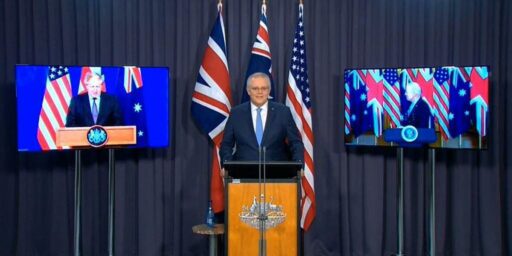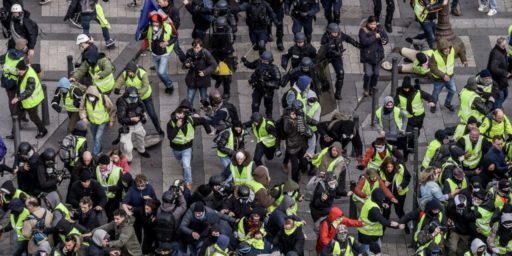MICHAEL WALZER
Michael Walzer is interviewed at Imprints and offers, as usual, very reasoned arguments on international conflict, in this case the Iraq conflict. Walzer is an interesting character: a Marxist whose views on warfare are taken so seriously that they have been required reading at West Point for two generations.
He is none too pleased with any of the major players in this one:
The criticisms that I have made of the Bush administration’s doctrine of pre-emptive war follow pretty closely, I think, the argument in Just and Unjust Wars (see the chapter on ‘Anticipations’). But my critique of French and German policy doesn’t have much to do with just war theory. It is a much more general moral/political critique, having to do with hypocrisy and irresponsibility rather than with injustice. France and Germany did not refuse to fight or wrongly resist a just war; they refused to provide what was in their power to provide: a serious alternative to an unjust war. I continue to believe, even at this late date, that had France and Germany (and Russia too) been willing to support, and had the UN Security Council been willing to authorise, a strongly coercive containment regime for Iraq, the war would have been, first, unnecessary, and second, politically impossible for the American government to fight. But this would have involved giving up the notion that force was a ‘last resort,’ as the French said, or morally impermissible, as the Germans said. For containment depended on force from the beginning: the no-fly zones and the embargo required forceful actions every day, and the restoration of the inspection regime depended on a credible American threat to use force. Now imagine the no-fly zones expanded to include the whole country; imagine the very porous embargo replaced by ‘smart sanctions,’ which actually shut down the import of military equipment (while permitting materials needed by the civilian population); imagine the inspectors strengthened by UN troops, who could patrol installations once they had been inspected, and by unannounced surveillance flights. Given all that, it would have been very difficult to make a case that Iraq was still a threat to its neighbours or to world peace. But the US did not want a regime of that sort, having settled on war early on; and France and Germany were not willing to support anything close to this: they had, in fact, decided that the appeasement of Saddam was the best policy.
This exchange is also interesting:
It is a good idea to strengthen the UN and to take whatever steps are possible to establish a global rule of law. It is a very bad idea to pretend that a strong UN and a global rule of law already exist. Most of the just uses of military force in the last thirty or forty years have not been authorised by the UN: the Vietnamese and Tanzanian interventions that I just mentioned; the Indian war against Pakistan that resulted in the secession of Bangla Desh and the return of millions of refugees; the Israeli pre-emptive strike against Egypt in 1967, after the abject withdrawal of UN forces from the Sinai; the Kosovo war in 1999. So far as justice, that is, moral legitimacy is concerned, if the Iraq war was unjust before the Security Council voted, it would have been unjust afterwards, however the vote went. It can’t be the case that when we try to figure out whether a war is just or unjust, we are predicting how the Council will vote. Indeed, justice would be independent of UN decision-making even if the UN were a global government, though then, assuming the democratic legitimacy of this government, we would be bound to respect its decisions.
As for your condition (b), I doubt that you would want to defend the proposition that democratic decisions should be made via opinion polls or mass demonstrations rather than by parliamentary majorities. We organise demonstrations to influence the parliamentary majority, and if we don’t do that, we wait until the next election. Watching from the US, and thinking about the virtual withdrawal of Congress from the American debate about the war, I had to feel that Blair’s necessary appearance before the Commons on the eve of war was a memorable democratic moment.
This is a longish piece, interspersed with questions from the moderator. It’s worth reading when you have a chance.
(Hat tip: Chris Betram at Crooked Timber)






To me, many of these conversations (right word for the interview?) always start with two flawed assumptions:
1) One must have an alternative to going to war with Iraq (i.e. no status quo)
2) The US would actually accept any form – regardless of how oppressive – of an inspection regime in the form of a second UNSC resolution
Since the complete lack of even a whiff of WMDs found after the war, combined with the complete dearth of solid intelligence before the war (as we are finding out), it’s completely justified – in retrospect – in doing absolutely nothing in Iraq. Status Quo. Certainly we could have waited for this fall, which was the offer on the table from France and Germany at the time of the war.
It is also quite clear that the US was completely uninterested in any more inspections. Otherwise, we would have actually had a second resolution. In fact, many arguments against a second resolution were based precisely on the assumption that further inspections wouldn’t work, so we don’t need a second resolution. Pretty much countering Michael’s premise.
One can make a lot of good sounding arguments about a lot of scenarios if the above 2 assumptions are actually true. A lot of these scenarios I’d actually agree with. But I think the facts speak otherwise. Certainly, knowing how crappy our WMD intelligence was at the time, it’s not impossible to imagine that other foreign governments were looking at the same data and coming to the same conclusion that the UN inspectors did when presented with the US intelligence: It was simply crap.
John,
For the most part, Walzer’s rationale for action in Iraq was humanitarian, with WMD/security issues being secondary. He ultimately opposed the war, although on very narrow grounds that have since been proven incorrect: That the military phase might last a long time and wind up killing too many Iraqis.
I was just responding to the two quotes you posted (still slogging through the whole thing). Mostly it’s just the UN bashing via those two assumptions that I disagree with.
Sure. Check out this old post–and especially the link to the Brookings forum–for more on his views about the war and the UN.
—